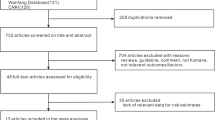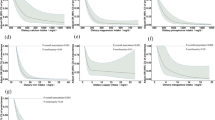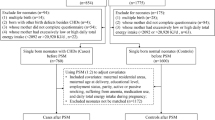Abstract
Background/Objectives:
Folic acid supplementation has been suggested to reduce the risk of preeclampsia. However, results from few epidemiologic studies have been inconclusive. We investigated the hypothesis that folic acid supplementation and dietary folate intake before conception and during pregnancy reduce the risk of preeclampsia.
Subjects/Methods:
A birth cohort study was conducted in 2010–2012 at the Gansu Provincial Maternity & Child Care Hospital in Lanzhou, China. A total of 10 041 pregnant women without chronic hypertension or gestational hypertension were enrolled.
Results:
Compared with nonusers, folic acid supplement users had a reduced risk of preeclampsia (OR=0.61, 95% CI: 0.43–0.87). A significant dose–response of duration of use was observed among women who used folic acid supplemention during pregnancy only (P-trend=0.007). The reduced risk associated with folic acid supplement was similar for mild or severe preeclampsia and for early- or late-onset preeclampsia, although the statistical significant associations were only observed for mild (OR=0.50, 95% CI: 0.30–0.81) and late-onset (OR=0.60, 95% CI: 0.42–0.86) preeclampsia. The reduced risk associated with dietary folate intake during pregnancy was only seen for severe preeclampsia (OR=0.52, 95% CI: 0.31–0.87, for the highest quartile of dietary folate intake compared with the lowest).
Conclusions:
Our study results suggest that folic acid supplementation and higher dietary folate intake during pregnancy reduce the risk of preeclampsia. Future studies are needed to confirm the associations.
This is a preview of subscription content, access via your institution
Access options
Subscribe to this journal
Receive 12 print issues and online access
$259.00 per year
only $21.58 per issue
Buy this article
- Purchase on Springer Link
- Instant access to full article PDF
Prices may be subject to local taxes which are calculated during checkout
Similar content being viewed by others
References
Roberts JM, Cooper DW . Pathogenesis and genetics of pre-eclampsia. Lancet 2001; 357: 53–56.
MacKay AP, Berg CJ, Atrash HK . Pregnancy-related mortality from preeclampsia and eclampsia. Obstet Gynecol 2001; 97: 533–538.
Ghulmiyyah L, Sibai B . Maternal mortality from preeclampsia/eclampsia. Semin Perinatol 2012; 36: 56–59.
Steegers EA, von Dadelszen P, Duvekot JJ, Pijnenborg R . Pre-eclampsia. Lancet 2010; 376: 631–644.
Roberts JM, Pearson G, Cutler J, Lindheimer M . Summary of the NHLBI Working Group on research on hypertension during pregnancy. Hypertension 2003; 41: 437–445.
Laivuori H, Kaaja R, Turpeinen U, Viinikka L, Ylikorkala O . Plasma homocysteine levels elevated and inversely related to insulin sensitivity in preeclampsia. Obstet Gynecol 1999; 93: 489–493.
Vollset SE, Refsum H, Irgens LM, Emblem BM, Tverdal A, Gjessing HK et al. Plasma total homocysteine, pregnancy complications, and adverse pregnancy outcomes: the Hordaland Homocysteine study. Am J Clin Nutr 2000; 71: 962–968.
Wang J, Trudinger BJ, Duarte N, Wilcken DE, Wang XL . Elevated circulating homocyst(e)ine levels in placental vascular disease and associated pre-eclampsia. BJOG 2000; 107: 935–938.
Sorensen TK, Malinow MR, Williams MA, King IB, Luthy DA . Elevated second-trimester serum homocyst(e)ine levels and subsequent risk of preeclampsia. Gynecol Obstet Invest 1999; 48: 98–103.
Rajkovic A, Mahomed K, Malinow MR, Sorenson TK, Woelk GB, Williams MA . Plasma homocyst(e)ine concentrations in eclamptic and preeclamptic African women postpartum. Obstet Gynecol 1999; 94: 355–360.
Homocysteine Lowering Trialists' Collaboration.. Lowering blood homocysteine with folic acid based supplements: meta-analysis of randomised trials. BMJ 1998; 316: 894–898.
Olthof MR, Bots ML, Katan MB, Verhoef P . Effect of folic acid and betaine supplementation on flow-mediated dilation: a randomized, controlled study in healthy volunteers. PLoS Clin Trials 2006; 1: e10.
Ray JG, Laskin CA . Folic acid and homocyst(e)ine metabolic defects and the risk of placental abruption, pre-eclampsia and spontaneous pregnancy loss: A systematic review. Placenta 1999; 20: 519–529.
Bodnar LM, Tang G, Ness RB, Harger G, Roberts JM . Periconceptional multivitamin use reduces the risk of preeclampsia. Am J Epidemiol 2006; 164: 470–477.
Hernandez-Diaz S, Werler MM, Louik C, Mitchell AA . Risk of gestational hypertension in relation to folic acid supplementation during pregnancy. Am J Epidemiol 2002; 156: 806–812.
Wen SW, Chen XK, Rodger M, White RR, Yang Q, Smith GN et al. Folic acid supplementation in early second trimester and the risk of preeclampsia. Am J Obstet Gynecol 2008; 198: 45 e1–45 e7.
Catov JM, Nohr EA, Bodnar LM, Knudson VK, Olsen SF, Olsen J . Association of periconceptional multivitamin use with reduced risk of preeclampsia among normal-weight women in the Danish National Birth Cohort. Am J Epidemiol 2009; 169: 1304–1311.
Sengpiel V, Bacelis J, Myhre R, Myking S, Pay AD, Haugen M et al. Folic acid supplementation, dietary folate intake during pregnancy and risk for spontaneous preterm delivery: a prospective observational cohort study. BMC Pregnancy Childbirth 2013; 13: 160.
Brantsæter LA HM, Samuelsen OS, Torjusen H, Trogstad L, Alexander J, Magnus P, Meltzer MH . A dietary pattern characterized by high intake of vegetables, fruits, and vegetable oils is associated with reduced risk of preeclampsia in nulliparous pregnant norwegian women. J Nutr 2009; 139: 1162–1168.
Qiu J, He X, Cui H, Zhang C, Zhang H, Dang Y et al. Passive smoking and preterm birth in urban China. Am J Epidemiol 2014; 180: 94–102.
Institute of Nutrition and Food Hygiene, Chinese Academy of Preventive Medicine Table of Food Components (national representative values). People's Hygiene Press: Beijing, 1999.
Roberts JM, Speer P . Antioxidant therapy to prevent preeclampsia. Semin Nephrol 2004; 24: 557–564.
Makedos G, Papanicolaou A, Hitoglou A, Kalogiannidis I, Makedos A, Vrazioti V et al. Homocysteine, folic acid and B12 serum levels in pregnancy complicated with preeclampsia. Arch Gynecol Obstet 2007; 275: 121–124.
Mujawar SA, Patil VW, Daver RG . Study of serum homocysteine, folic Acid and vitamin b(12) in patients with preeclampsia. Indian J Clin Biochem 2011; 26: 257–260.
Dodds L, Fell DB, Dooley KC, Armson BA, Allen AC, Nassar BA et al. Effect of homocysteine concentration in early pregnancy on gestational hypertensive disorders and other pregnancy outcomes. Clin Chem 2008; 54: 326–334.
Sanchez SE, Zhang C, Rene Malinow M, Ware-Jauregui S, Larrabure G, Williams MA . Plasma folate, vitamin B(12), and homocyst(e)ine concentrations in preeclamptic and normotensive Peruvian women. Am J Epidemiol 2001; 153: 474–480.
Yamamoto K, Isa Y, Nakagawa T, Hayakawa T . Folic acid fortification ameliorates hyperhomocysteinemia caused by a vitamin B(6)-deficient diet supplemented with L-methionine. Biosci Biotechnol Biochem 2012; 76: 1861–1865.
deBree A, Verschuren WM, Blom HJ, Kromhout D . Lifestyle factors and plasma homocysteine concentrations in a general population sample. Am J Epidemiol 2001; 154: 150–154.
Chuang CZ, Boyles A, Legardeur B, Su J, Japa S, Lopez SA . Effects of riboflavin and folic acid supplementation on plasma homocysteine levels in healthy subjects. Am J Med Sci 2006; 331: 65–71.
Scorsatto M, Uehara SK, Luiz RR, de Oliveira GM, Rosa G . Fortification of flours with folic acid reduces homocysteine levels in Brazilian women. Nutr Res 2011; 31: 889–895.
Moat SJ, Lang D, McDowell IF, Clarke ZL, Madhavan AK, Lewis MJ et al. Folate, homocysteine, endothelial function and cardiovascular disease. J Nutr Biochem 2004; 15: 64–79.
Li Z, Ye R, Zhang L, Li H, Liu J, Ren A . Folic acid supplementation during early pregnancy and the risk of gestational hypertension and preeclampsia. Hypertension 2013; 61: 873–879.
Chen CL, Cheng Y, Wang PH, Juang CM, Chiu LM, Yang MJ et al. Review of pre-eclampsia in Taiwan: a multi-institutional study. Zhonghua yi xue za zhi=Chinese medical journal; Free. Chinaed. 2000; 63: 869–875.
World health organization international colaborative study of hypertensive disorders of pregnancy. Geographic variation in the incidence of hypertension in pregnancy. Am J Obstet Gynecol 1988; 158: 80–83.
Duley L . The global impact of pre-eclampsia and eclampsia. Semin Perinatol 2009; 33: 130–137.
Acknowledgements
We thank all the study personnel from the Gansu Provincial Maternity and Child Care Hospital for their exceptional efforts on study subject recruitment. This work was supported by internal funding from the Gansu Provincial Maternity and Child Care Hospital, and the National Institutes of Health grants (K02HD70324).
Author information
Authors and Affiliations
Corresponding authors
Ethics declarations
Competing interests
The authors declare no conflict of interest.
Rights and permissions
About this article
Cite this article
Wang, Y., Zhao, N., Qiu, J. et al. Folic acid supplementation and dietary folate intake, and risk of preeclampsia. Eur J Clin Nutr 69, 1145–1150 (2015). https://doi.org/10.1038/ejcn.2014.295
Received:
Revised:
Accepted:
Published:
Issue Date:
DOI: https://doi.org/10.1038/ejcn.2014.295
This article is cited by
-
Paternal factors and adverse birth outcomes in Lanzhou, China
BMC Pregnancy and Childbirth (2021)
-
The impact of particulate matter 2.5 on the risk of preeclampsia: an updated systematic review and meta-analysis
Environmental Science and Pollution Research (2020)
-
Higher maternal plasma folate, vitamin B12 and homocysteine levels in women with preeclampsia
Journal of Human Hypertension (2019)
-
Supplementation of folic acid in pregnancy and the risk of preeclampsia and gestational hypertension: a meta-analysis
Archives of Gynecology and Obstetrics (2018)
-
Pre-pregnancy BMI, gestational weight gain and risk of preeclampsia: a birth cohort study in Lanzhou, China
BMC Pregnancy and Childbirth (2017)



